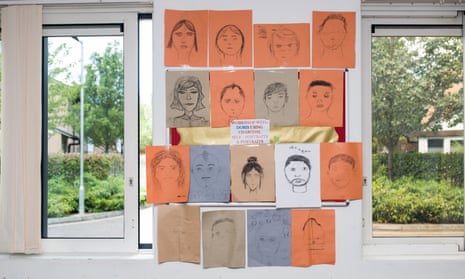Almost 400,000 children and young people a year in England are being treated for mental health problems, the highest number ever, NHS figures show.
There were a total of 389,727 “active referrals” for people aged 18 or younger in April, a third higher than the same month two years ago, according to the latest statistics published by NHS Digital.
The number seeking help for conditions such as anxiety, depression and eating disorders is rising sharply.
Almost 50,000 children and young people a month are being referred, mainly by their GP, for mental health treatment. About 900 of those referrals are because of an eating disorder, mainly anorexia nervosa.
Another 42,455 under-19s were discharged in April after receiving treatment, the figures showed.
The mental health charity Young Minds said the figures underlined the huge demand for help from children and young people who were struggling mentally but were an underestimate of the true scale of need.
Experts have warned that there is an unfolding crisis in young people’s mental health linked to increased pressure to do well at school, body image issues, the influence of social media and difficult family backgrounds.
Tom Madders, Young Mind’s campaigns director, said: “These figures are a stark reminder of the extent of the mental health crisis, with more children than ever before accessing services … We know that many more families can’t get the support they need.
“Every day we hear from parents whose children have waited months for an assessment, been turned down for treatment or been told by their GPs that there’s no point asking for a referral because services in their area are so overstretched.”
The 389,727 includes everyone who had ongoing contact with NHS services in April, including those who were being treated, had been treated but not been discharged and those who were waiting to start treatment.
NHS England admits that only one in four people under 18 with a diagnosable mental health problem receives treatment, with the others deemed not to need help after undergoing triage. It plans to increase that to 35% of all those needing help by 2020-21.
Psychiatrists specialising in children’s and young people’s mental health welcomed the growing number of referrals as a sign that more were being treated, but that the NHS mental health workforce was too small to treat all those seeking help.
Dr Bernadka Dubicka, the chair of the child and adolescent faculty at the Royal College of Psychiatrists, said: “It is great to see that more and more young people are having their mental health problems identified … Mental health is clearly becoming less taboo, and services are becoming more accessible.
“But to treat such a large group, we need a great enough workforce. Current demand is far outstripping supply. Child and adolescent psychiatrists fell by 6.6% between May 2013 and May 2017.”
Theresa May has said that improving children and young people’s mental health, and their access to services, was a priority for her government. In November, a green paper was published outlining proposals, such as expanding schools’ role in identifying and helping young people, and a maximum four-week waiting time for starting treatment, though that will be phased in very gradually.
Madders said: “The prime minister’s recent commitment to improve access to children’s mental health services is welcome, but this needs to translate into increased, long-term investment, so that all young people can get the right support. Schools must also be given the resources and recognition they need to make children’s wellbeing a genuine priority.”
NHS England has increased the number of beds available for young people with mental health problems needing inpatient care. The move is in response to some under-18s being sent hundreds of miles from home for care because of bed shortages in their own area.
The number of adults in contact with NHS mental health services has fallen slightly, the same NHS Digital data shows. In April there were 988,990 active referrals compared with 1,030,706 in the same month in 2016.
